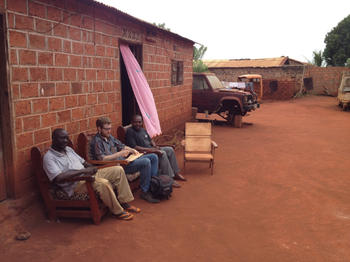Security Studies from the Porch of a Safari Hotel - Field Research Report on the Central African Republic
News from Jul 10, 2015
“We must be strong and assert ourselves!” says the slender man and flexes the muscles in his arm, “it’s the only way we can get a grip on our country”.
On the table in front of him rest the official seal and a small flag of the Central African Republic. Feyomona is the Prefect of Bangassou, a small town in the south. He’s wearing sandals and an “international woman’s day” shirt. He made the porch of an abandoned safari hotel into his new office. First, Séléka rebels ransacked his original Prefect’s office and took electronics and money. Afterwards, thieves even dismantled the tin foil roof to sell it on the market. At that time, Feyomona had already fled into the Congo forest.
Now he’s seated in his wicker chair opposite us, Lotje de Vries and Tim Glawion, who arrived with an essential question for him: How can security be reestablished in such a situation? The Prefect talks about regional development plans that he coauthored and drops the names of Rousseau and Kant. He is a true patriot. But his state is weak: Security in Bangassou is not provided by the three national gendarmes, but rather by the 100 UN soldiers stationed in town. Public schools are in a devastating state, while the Catholic Church runs a nationally renowned boarding school. The Prefect himself possesses nothing but his desk – no employee, no car, not even a bicycle. And the budget coffers are empty.
The conditions in the other places Lotje and I visited are even worse: In the north, in Paoua, two policemen and three gendarmes are responsible for 240,000 citizens in the wider region. They are overwhelmed. 150 UN soldiers keep the peace – at least within town. The surroundings are ruled by bandits and rebels. In the southeastern corner, in Obo, people don’t dare leave their village. There, every couple of months the Ugandan Lord’s Resistance Army commits atrocities against the population despite the presence of 1500 Ugandan soldiers and 100 American advisors. Actually, by now the threats stemming from poachers and militias out of the border triangle region have become the largest threat.
The country is marked by hundreds of marauding armed groups that effectively cut off dozens of towns from the outside world. UN airplanes and armed convoys are the only ones reaching these isolated areas. Much more worrying and profound are the divisions within society: Distrust undermines peaceful cohabitation among religious confessions, ethnic and economic groups. Finding alternative means of security provision in such circumstances is a massive undertaking. Current security analyses are often limited to international intervention and national state-led reform processes. Within the Collaborative Research Center’s C10 project we compare developments in peripheries of the Central African Republic with remote areas of South Sudan to research alternative bottom-up approaches to reestablishing security.
|
About the author: Tim Glawion is a research associate at the SFB 700 and the German Institute of Global and Area Studies (GIGA) and investigates for the Research Project C10 security provision in Areas of Limited Statehood in South Sudan, the Central African Republic, and Somaliland. |




